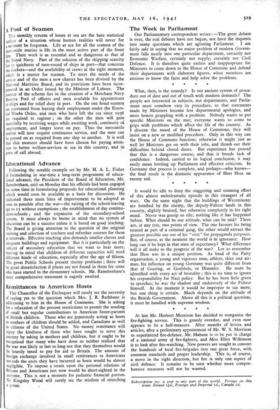Educational Advance
Following the notable example set by Mr. H. A. L. Fisher of formulating in war-time a long-term programme of educa- tional advance, the President of the Board of Education, Mr. Ramsbotham, said on Monday that his officials had been engaged for some time in formulating proposals for educational planning which would soon be available as a basis for discussion. He indicated three main lines of improvement to be adopted as soon as possible after the war—the raising of the school-leaving age to 15 without exemptions ; the establishment of day continu- ation-schools; and the expansion of the secondary-school system. It must always be borne in mind that no system of education can be a success unless it is based on good teaching. The Board is giving attention to the question of the original training and selection of teachers and refresher courses for them at intervals. Effective teaching also demands smaller classes and adequate buildings and equipment. But it is particularly on the subject of secondary education that we want to hear more, bearing in mind that children of different capacities will need different kinds of education, especially after the age of fifteen. The great Public Schools present thorny problems ; there will be great dissatisfaction if places are not found in them for some who have started in the elementary schools. Mr. Ramsbotham's more comprehensive statement is eagerly awaited.


























 Previous page
Previous page